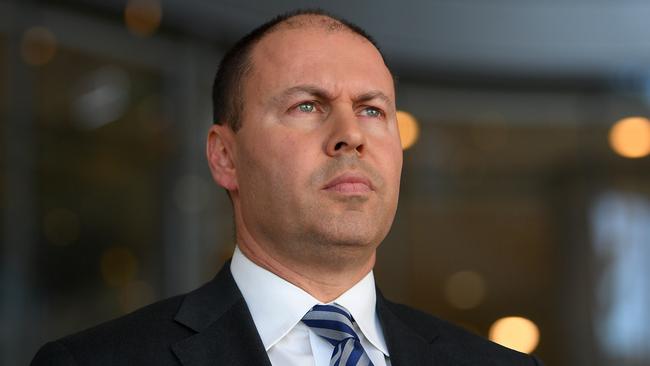Josh Frydenberg blasts big four banks for failing to pass on interest rate cuts in full
Josh Frydenberg blasts the big four banks for failing to pass on interest rate cuts in full to their customers.

Treasurer Josh Frydenberg has blasted the big four banks for failing to pass on interest rate cuts in full to their customers, declaring they have “a lot of explaining to do.”
It comes as the Reserve Bank slashed the official interest rate to a historic low of 0.75 per cent, while signalling it is prepared to make further cuts and chart new ground in monetary policy.
Mr Frydenberg said the banks were not only defying the government, but also the Reserve Bank.
“The banks have a lot of explaining to do because this is very disappointing,” he told Nine’s Today Show on Wednesday. “Customers should vote with their feet.”
MORE: RBA charts new growth plan | Judith Sloan writes the RBA’s rationale just doesn’t add up | Adam Creighton says the RBA should have waited
The Treasurer encouraged consumers to shop around and “make their displeasure known” to the banks and pointed out some of the smaller lenders had passed on the rate cut in full.
Hours after the historic decision, two of the nation’s biggest lenders — the Commonwealth Bank and National Australia Bank — defied Mr Frydenberg by refusing to pass in full the 25 basis point cut to the official cash rate. The CBA cut its standard variable mortgage rate by just 13 basis points while NAB cut 15 points.
Westpac and ANZ are yet to pass on any rate cuts to their customers.
It was the third cut this year, as the central bank tries to push the unemployment rate down and inflation and wage growth up.
In a statement after Tuesday’s RBA board meeting, governor Philip Lowe said the move would “support employment and income growth” and “provide greater confidence that inflation will be consistent with the medium-term target”.
The cut follows a slump in economic growth and rising uncertainty stemming from the escalating US-China trade war.
But Mr Frydenberg ruled out announcing new tax cuts, saying the government was sticking to its economic plan and was waiting for its effects to flow through to the economy.
“In the last June quarter the national accounts did not take into account those tax cuts or the full benefits of the rate cuts, so the money is going out the door.”
When pressed whether any tax cuts were on the table, Mr Frydenberg said “We are sticking to our economic plan, which is a plan that has developed more than 1.4 million new jobs, that is the tax cuts we took to the Australian people at the last election and that is the infrastructure plan we took and that will play through across the economy.”
Mr Frydenberg said the Australian economy was continuing to grow while other big economies such as Germany and Singapore had all experienced negative economic growth in the June quarter.
“We have a triple A credit rating, we’ve seen a stabilisation in the housing market and of course the government will ensure more jobs are created.”
Anthony Albanese said it was a “disgrace” some of the big banks had not passed the interest rate cut on in full and pressured the government to “do something about it”. He claimed the government was being “complacent”.
“They can’t just sit back as spectators while this occurs. Interest rates are now below 1 per cent for the first time in our history,” the Opposition Leader said.
“What does it take to shake this government out of its complacency when it comes to the need to manage the national economy? This is third interest rate decrease since the election, since May. It’s only the beginning of October. This is quite remarkable.”
Mr Albanese said the record-low rate reflected low consumer demand, weak economic growth and stagnant wages.
“The banks, frankly, have done themselves a disservice. I would have thought that the banks should have got the big message over the last few years when Labor forced a reluctant government to have the royal commission,” Mr Albanese said.
“This will just reinforce how out of touch the banks are by not passing on the full amount. They should reconsider, the government should pressure them, into making sure that this 0.25 per cent reduction is passed on in full.”



To join the conversation, please log in. Don't have an account? Register
Join the conversation, you are commenting as Logout